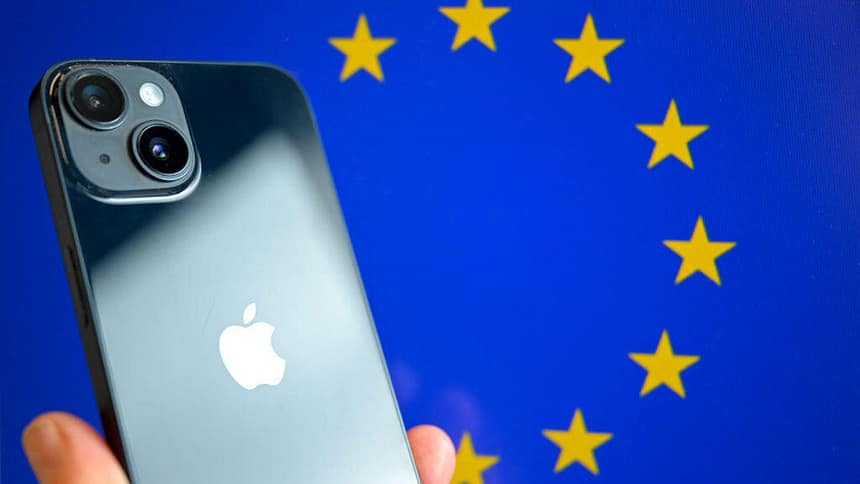The EU’s crackdown on Big Tech began in earnest on Wednesday, as the European Commission issued the first fines under the Digital Markets Act, a piece of regulation designed to keep major players in the technology world from abusing their dominant position in the industry.
Apple’s fine, the bigger of the two, totals 500 million euros ($570 million), and follows an investigation into whether the company has been preventing customers from viewing and accessing offers that could save them money — cheaper streaming subscriptions, for instance — if they paid outside of its App Store ecosystem. The European Commission found that Apple prevents app developers from informing people about cheaper ways to pay, and has ordered the company to change this practice.
Meta, meanwhile, has received a fine of 200 million euros ($228 million), due to the fact it provides people in Europe with a binary choice to either use Meta’s platforms — including Facebook, Instagram and WhatsApp — for free and accept the company will combine your data across services, or pay a premium to ensure an ad-free experience in which your data is kept separate.
Since the European Commission initially told Meta this model did not comply with the DMA, the company introduced new practices that provide people with more choice over how their data is used. But the company has still received a fine for its previous model.
Silicon Valley and the EU have long had a fractious relationship. Almost 10 years ago, Apple CEO Tim Cook dismissed a massive EU tax bill as “political crap.” But with geopolitical tensions between Europe and the US at a high right now, the fines are more divisive than ever. It’s often tricky to see how the high-level regulatory decisions affect the tech industry, but you only need to look at Apple dropping the lighting port on the iPhone in favor of USB-C charging to understand the power of the EU to sway the behavior of tech companies.
The aim of the Digital Markets Act is twofold. It gives up-and-coming tech companies an opportunity to prove themselves in an industry dominated by the world’s wealthiest companies. It’s also designed to ensure tech users across Europe (and sometimes further afield) have access to the best services and deals, plus the ability to decide for themselves how to spend their money and how their data is used. The European Commission does have the power to fine companies up to 10% of their annual global revenue under this regulation, but these fines fall below this threshold in an effort to be proportionate with the specific violations of the law.
“Enabling free business and consumer choice is at the core of the rules laid down in the Digital Markets Act,” Henna Virkkunen, executive vice president for technological sovereignty at the European Commission, said in a statement Tuesday. “This includes ensuring that citizens have full control over when and how their data is used online, and businesses can freely communicate with their own customers. The decisions adopted today find that both Apple and Meta have taken away this free choice from their users and are required to change their behaviour.”
But to the Silicon Valley tech giants, the EU’s approach can often seem unnecessarily punitive, in some cases forcing them to make changes that they argue are actually worse for users. In a statement issued on Wednesday, a spokesperson for Apple accused the European Commission of moving the goalposts, and said the company planned to appeal the decision.
“Today’s announcements are yet another example of the European Commission unfairly targeting Apple in a series of decisions that are bad for the privacy and security of our users, bad for products, and force us to give away our technology for free,” the company’s spokesperson said. “We have spent hundreds of thousands of engineering hours and made dozens of changes to comply with this law, none of which our users have asked for.”
Meanwhile, Meta’s chief global affairs officer Joel Kaplan said the European Commission was “attempting to handicap successful American businesses while allowing Chinese and European companies to operate under different standards.” He added, “This isn’t just about a fine. The Commission forcing us to change our business model effectively imposes a multi-billion-dollar tariff on Meta while requiring us to offer an inferior service. And by unfairly restricting personalized advertising the European Commission is also hurting European businesses and economies.”
It’s likely that Meta, feeling aggrieved over being penalized even after making multiple changes to its business model, will also appeal the fine. The company remains adamant there’s nothing in the Digital Markets Act to justify the changes the European Commission is asking it to make.





